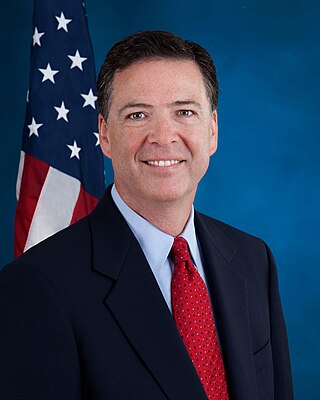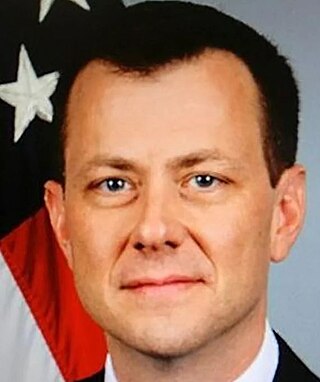Judicial Watch (JW) is a 501(c)(3) nonprofit American conservative activist group that files Freedom of Information Act (FOIA) lawsuits to investigate claimed misconduct by government officials. Founded in 1994, JW has primarily targeted Democrats, in particular the administrations of Bill Clinton and Barack Obama, as well as Hillary Clinton's role in them. It was founded by attorney Larry Klayman, and has been led by Tom Fitton since 2003.

James Brien Comey Jr. is an American lawyer who was the seventh director of the Federal Bureau of Investigation (FBI) from 2013 until his termination in May 2017. Comey was a registered Republican for most of his adult life; however, in 2016, he described himself as unaffiliated.
During her tenure as United States Secretary of State, Hillary Clinton drew controversy by using a private email server for official public communications rather than using official State Department email accounts maintained on federal servers. After a years-long FBI investigation, it was determined that Clinton's server did not contain any information or emails that were clearly marked classified. Federal agencies did, however, retrospectively determine that 100 emails contained information that should have been deemed classified at the time they were sent, including 65 emails deemed "Secret" and 22 deemed "Top Secret". An additional 2,093 emails were retroactively designated confidential by the State Department.

Social media played an important role in shaping the course of events surrounding the 2016 United States presidential election. It facilitated greater voter interaction with the political climate; unlike traditional media, social media gave people the ability to create, comment on, and share content related to the election.
The 2016 Democratic National Committee email leak is a collection of Democratic National Committee (DNC) emails stolen by one or more hackers operating under the pseudonym "Guccifer 2.0" who are alleged to be Russian intelligence agency hackers, according to indictments carried out by the Mueller investigation. These emails were subsequently leaked by DCLeaks in June and July 2016 and by WikiLeaks on July 22, 2016, just before the 2016 Democratic National Convention. This collection included 19,252 emails and 8,034 attachments from the DNC, the governing body of the United States Democratic Party. The leak includes emails from seven key DNC staff members dating from January 2015 to May 2016. On November 6, 2016, WikiLeaks released a second batch of DNC emails, adding 8,263 emails to its collection. The emails and documents showed that the Democratic Party's national committee favored Clinton over her rival Bernie Sanders in the primaries. These releases caused significant harm to the Clinton campaign, and have been cited as a potential contributing factor to her loss in the general election against Donald Trump.

"Guccifer 2.0" is a persona which claimed to be the hacker(s) who gained unauthorized access to the Democratic National Committee (DNC) computer network and then leaked its documents to the media, the website WikiLeaks, and a conference event. Some of the documents "Guccifer 2.0" released to the media appear to be forgeries cobbled together from public information and previous hacks, which had been mixed with disinformation. According to indictments in February 2018, the persona is operated by Russian military intelligence agency GRU. On July 13, 2018, Special Counsel Robert Mueller indicted 12 GRU agents for allegedly perpetrating the cyberattacks.
The murder of Seth Rich occurred on July 10, 2016, at 4:20 a.m. in the Bloomingdale neighborhood of Washington, D.C. Rich died about an hour and a half after being shot twice in the back. The perpetrators were never apprehended; police suspected he had been the victim of an attempted robbery.

DCLeaks was a website that was established in June 2016. It was responsible for publishing leaks of emails belonging to multiple prominent figures in the United States government and military. Cybersecurity research firms determined the site is a front for the Russian cyber-espionage group Fancy Bear. On July 13, 2018, an indictment was made against 12 Russian GRU military officers; it alleged that DCLeaks is part of a Russian military operation to interfere in the 2016 U.S. presidential election.
In March 2016, the personal Gmail account of John Podesta, a former White House chief of staff and chair of Hillary Clinton's 2016 U.S. presidential campaign, was compromised in a data breach accomplished via a spear-phishing attack, and some of his emails, many of which were work-related, were hacked. Cybersecurity researchers as well as the United States government attributed responsibility for the breach to the Russian cyber spying group Fancy Bear, allegedly two units of a Russian military intelligence agency.

"Pizzagate" is a conspiracy theory that went viral during the 2016 United States presidential election cycle, falsely claiming that the New York City Police Department (NYPD) had discovered a pedophilia ring linked to members of the Democratic Party while searching through Anthony Weiner's emails. It has been extensively discredited by a wide range of organizations, including the Washington, D.C. police.

The Russian government interfered in the 2016 United States elections with the goals of sabotaging the presidential campaign of Hillary Clinton, boosting the presidential campaign of Donald Trump, and increasing political and social discord in the United States. According to the U.S. intelligence community, the operation—code named Project Lakhta—was ordered directly by Russian president Vladimir Putin. The 448-page Mueller Report, made public in April 2019, examined over 200 contacts between the Trump campaign and Russian officials but concluded that there was insufficient evidence to bring any conspiracy or coordination charges against Trump or his associates.
Fake news websites target United States audiences by using disinformation to create or inflame controversial topics such as the 2016 election. Most fake news websites target readers by impersonating or pretending to be real news organizations, which can lead to legitimate news organizations further spreading their message. Most notable in the media are the many websites that made completely false claims about political candidates such as Hillary Clinton and Donald Trump, as part of a larger campaign to gain viewers and ad revenue or spread disinformation. Additionally, satire websites have received criticism for not properly notifying readers that they are publishing false or satirical content, since many readers have been duped by seemingly legitimate articles.

The Steele dossier, also known as the Trump–Russia dossier, is a controversial political opposition research report compiled by Christopher Steele that was published without permission as an unfinished 35-page compilation of "unverified, and potentially unverifiable" raw intelligence reports—"not established facts, but a starting point for further investigation". It was written from June to December 2016 and contains allegations of misconduct, conspiracy, and cooperation between Donald Trump's presidential campaign and the government of Russia prior to and during the 2016 election campaign. Several key allegations made in June 2016 about the Russian government's efforts to get Trump elected were later described as "prescient" because they were corroborated six months later in the January 2017 report by the Office of the Director of National Intelligence and the Mueller Report, namely that Vladimir Putin favored Trump over Hillary Clinton; that he personally ordered an "influence campaign" to harm Clinton's campaign and to "undermine public faith in the US democratic process"; that he ordered cyberattacks on both parties; and that many Trump campaign officials and associates had numerous secretive contacts with Russian officials and agents.

This is a timeline of events related to Russian interference in the 2016 United States elections.

Peter Paul Strzok II is a former United States Federal Bureau of Investigation (FBI) agent. He was the Deputy Assistant Director of the FBI's Counterintelligence Division and led the investigation into Russian interference in the 2016 United States elections. Previously, he had been the chief of the division's Counterespionage Section and led the investigation into Hillary Clinton's use of a personal email server.

This is a timeline of events related to Russian interference in the 2016 United States elections, sorted by topics. It also includes events described in investigations into the many suspicious links between Trump associates and Russian officials and spies. Those investigations continued in 2017, the first and second halves of 2018, and 2019, largely as parts of the Crossfire Hurricane FBI investigation, the Special Counsel investigation, multiple ongoing criminal investigations by several State Attorneys General, and the investigation resulting in the Inspector General report on FBI and DOJ actions in the 2016 election.

This is a timeline of major events in the second half of 2017 related to the investigations into the many suspicious links between Trump associates and Russian officials and spies relating to the Russian interference in the 2016 United States elections. It follows the timeline of Russian interference in the 2016 United States elections before and after July 2016 up until election day November 8, the post-election transition, and the first half of 2017. The investigations continued in the first and second halves of 2018, the first and second halves of 2019, 2020, and 2021.

This is a timeline of events related to Russian interference in the 2016 United States elections.

The 2016 United States election leaks were a series of publications of more than 150,000 stolen emails and other files during the U.S. presidential election campaigns released by Guccifer 2.0, DCLeaks and WikiLeaks. Computer hackers allegedly affiliated with the Russian military intelligence service (GRU) infiltrated information systems of the Democratic National Committee (DNC), the Democratic Congressional Campaign Committee (DCCC), and Clinton campaign officials, notably chairman John Podesta, and leaked some of the stolen materials. Emails from Guccifer 2.0 to journalists suggest a link to DCLeaks, and messages WikiLeaks exchanged with Guccifer 2.0 and DCLeaks suggest both submitted emails to WikiLeaks.
True Pundit is a far-right fake news website known for publishing conspiracy theories. According to The Atlantic, True Pundit had "a well-known modus operandi, perfected during the 2016 U.S. election: running baseless stories and then asking leading questions". In 2021 True Pundit stopped publishing new content.







